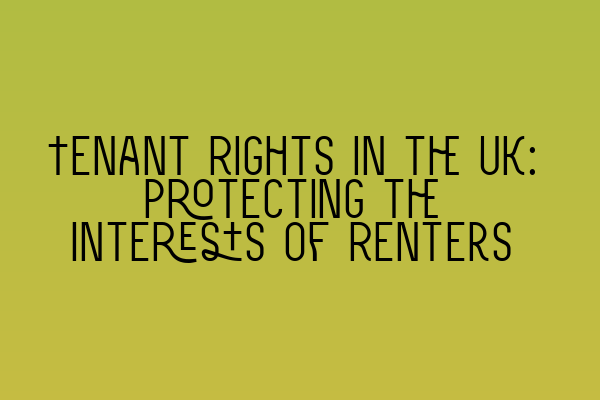Tenant Rights in the UK: Protecting the Interests of Renters
As an essential part of the UK housing market, renters have the right to a safe and secure home. Understanding these rights is crucial for tenants to protect themselves from unfair treatment and ensure a positive renting experience. In this blog post, we will explore the key tenant rights in the UK and shed light on how tenants can assert their rights.
1. Right to a Written Tenancy Agreement:
One of the first rights a tenant should be aware of is the right to receive a written tenancy agreement. This agreement outlines the terms and conditions of the tenancy, including the duration, rent amount, and any additional responsibilities. It is essential for tenants to carefully read and understand the agreement before signing it. If any terms are unclear or if there are concerns about unfair clauses, seeking legal advice is recommended.
2. Right to a Safe and Livable Property:
Every tenant in the UK has the right to live in a safe and livable property. Landlords have a legal obligation to ensure that the property meets basic health and safety standards. This includes providing a property free from damp and mold, maintaining electrical safety, and ensuring adequate ventilation. If a tenant notices any hazards or unsafe conditions in their rented property, they should promptly report them to the landlord or letting agent. If the landlord fails to address the issues, tenants can raise a complaint to the local council or seek legal advice.
3. Right to Protection from Unfair Eviction:
Tenants have the right to be protected from unfair eviction. In most cases, landlords must follow a specific eviction process, which involves giving proper notice and obtaining a possession order from the court. It is crucial for tenants to be aware of their eviction rights and consult a solicitor if they believe they are facing an unlawful eviction. Proper legal representation can help tenants understand their rights, negotiate with the landlord, and protect their tenancy.
4. Right to Privacy:
Tenants have the right to privacy and peaceful enjoyment of their rented property. Landlords or letting agents should not enter the rented property without providing reasonable notice, except in case of emergencies. It is advisable for tenants to maintain good communication with their landlord and make sure that any inspections or repairs are scheduled at convenient times. If the landlord repeatedly invades the tenant’s privacy or enters the property without notice, tenants can seek legal assistance to enforce their rights.
5. Right to Redress:
If tenants face any issues with their landlord or letting agent, there are mechanisms in place to seek redress. The first step is to raise any concerns or complaints directly with the landlord or letting agent. If they fail to resolve the issue satisfactorily, tenants can contact their local council’s housing department or consider using alternative dispute resolution services, such as mediation. In serious cases where the landlord has breached their legal obligations, tenants can take legal action in court. It is essential for tenants to gather evidence and seek legal advice before initiating legal proceedings.
6. Right to Challenge Unfair Rent Increases:
Tenants have the right to challenge unfair rent increases. While landlords generally have the freedom to set the rent, they must follow specific rules when increasing it. If a tenant believes that a rent increase is unreasonable, they can contact a solicitor who specializes in property law for advice. Solicitors can review the tenancy agreement and any relevant legislation to assess the fairness of the proposed increase.
7. Right to a Deposit Protection Scheme:
In the UK, landlords are required to protect their tenants’ deposits in a government-approved scheme. Tenants have the right to receive information about the deposit protection scheme within 30 days of paying the deposit. This protection ensures that tenants can get their deposit back at the end of the tenancy, minus any deductions for damages or outstanding rent. If a landlord fails to protect the deposit, tenants may be eligible to claim compensation or have their deposit returned in full.
It is important for tenants to educate themselves about their rights and seek professional advice when needed. Legal professionals, such as solicitors specializing in property law, can provide guidance and represent tenants in disputes with landlords or letting agents. By understanding their rights and actively asserting them, tenants can ensure their interests are protected throughout their tenancy.
For more information on legal matters related to property law or preparing for the SQE exams, please check out our related articles:
– SQE 1 Practice Exam Questions
– SQE 1 Practice Mocks FLK1 FLK2
– SQE 2 Preparation Courses
– SQE 1 Preparation Courses
– SRA SQE Exam Dates
At SQE Property Law & Land Law, our team of experienced solicitors is ready to assist renters with their legal needs. Contact us today to schedule a consultation and protect your rights as a tenant.
